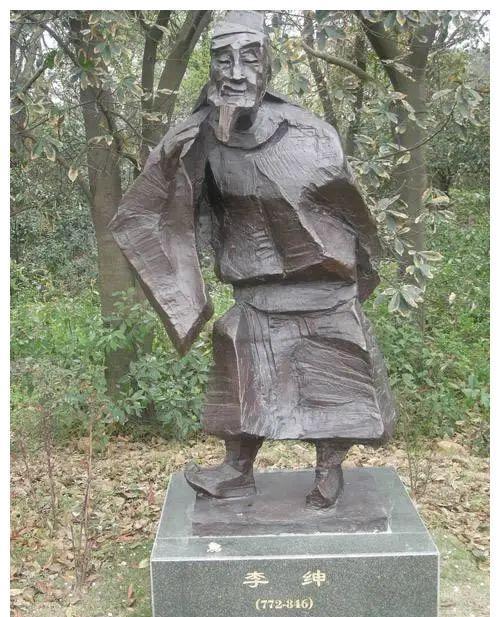
In the fifth year of Emperor Wuzong of Tang (845 AD), a strange case occurred in Yangzhou Jiangdu - the "Wu Xiang Case".
Wu Xiang, a lieutenant in Jiangdu County, Yangzhou, was reported for corruption and robbed a woman as his wife, which seemed to be a simple case, but in fact it was artificially complicated, and the official who tried the case was Li Sheng, the envoy of Huainan Jiedu.
Li Sheng, also spelled Gong Chui, was born in Wucheng, Huzhou (present-day Huzhou, Zhejiang) in the seventh year of the Gregorian calendar (772), and his father Li Huan was serving as the commander of Wucheng County.
When Li Shen was six years old, his father died and he moved with his mother to Wuxi, Runzhou.
Li Shen looked "small and sharp in shape, able to sing poetry", short in length, but good at writing poetry, erudite and talented since childhood.
After passing the examination for the Middle School, he was initially appointed as a Hanlin scholar, and later served as an assistant teacher of Guozi, a Zhongshu Shilang, a Shangshu Right Servant, and a Huainan Jiedu Envoy.
In the sixth year of Huichang (846), Li Shen died of illness in Yangzhou at the age of seventy-four, and was posthumously awarded the title of Taiwei by the imperial court.
Twenty poems of the "New Title of Lefu" were left behind, which were later lost, and the Quan Tang Poems preserved four volumes of his poems.
When it comes to Li Shen's poetry, many people will think of his poem "Mercy Nong": "When the day of hoeing is noon, the sweat drops down to the soil." Who knows the plate of Chinese food, the grains are hard. Little is known about Li Sheng's trial.
The Old Book of Tang records that Li Sheng took over the "Wu Xiang case" and immediately sent someone to arrest Wu Xiang, try it, sentence him to death, and then report to the imperial court and wait for approval.
After carefully analyzing the case, the DPRK-China Imperial Historian Choi Won-zao and other advisors held that there seemed to be grievances in the case.
Emperor Wuzong of Tang then sent Yushi Cui Yuanzao to Yangzhou for a review.
Cui Yuanzao's investigation results were: Wu Xiang's corruption was true, but the amount was not large, according to the "Tang Law", just accepting the scepter, even if it was more serious, at most it was exiled for two thousand miles, and the crime did not lead to death.
As for Wu Xiangqiang robbing the people's daughters, it is purely out of nothing for the informers.
Cui Yuanzao and Li Sheng, each of whom made a statement to the emperor, that the chancellor Li Deyu had squeezed Cui Yuanzao out, but was vigorously defending his henchman Li Sheng, and Tang Wuzong finally agreed to sentence Wu Xiang to death, and soon after, the unjust leader Wu Xiang was beheaded.
Li Shen had compassion for the old peasants, so why was he so cruel to Wu Xiang?
Children have no mother, it is a long story.
The reason why Li Shen insisted on executing Wu Xiang was to repay the grace of the powerful minister Li Deyu, who was proud of his career and relied on Li Deyu's hand.
Li Deyu and Wu Xiang had a festival, in fact, the two did not know each other.
Wu Xiang was unlucky, but it was related to his uncle Wu Wuling.
When Wu Wuling, a scholar of Hanlin, offended Li Deyu's grandfather Li Bo and his father Li Jifu when he was young, the two families formed a vendetta, and this account was counted on the head of Wu Wuling's nephew Wu Xiang.
In the first year of Emperor Xuanzong of Tang's reign (847), Wu Xiang's elder brother, Wu Runa, a lieutenant of Yongning County, appealed to his brother and asked the government to retry the "Wu Xiang Case".
The newly appointed emperor Li Chen of Tang Xuanzong was anxious to show his wisdom, so he fully supported the retrial of the "Wu Xiang case", and after investigation by officials, the results confirmed that it was indeed an unjust case.
At that time, Li Shen had already died and escaped punishment, and Tang Xuanzong issued an edict: "The three officials of the gentry are cut, the descendants are not allowed, and the debacle is devalued." Promoted to The Left Left, Yuanzao Martial Arts Order. ”
Li Shen was stripped of his posthumous official position, and although he was already dead, he still had to "repay the debt of his father and son", and Li Shen's descendants were not allowed to become officials for the rest of their lives.
Crown Prince Shaobao Li Deyu was demoted to Sima of Chaozhou, Wu Runa was promoted to Zuo Shiyi, and Cui Yuanzao was promoted to Wugong Ling.
At this point, the absurd farce of the "Wu Xiang case" came to an end.